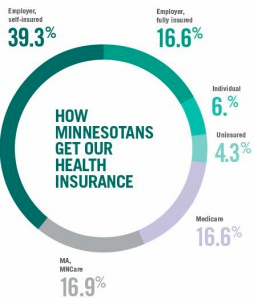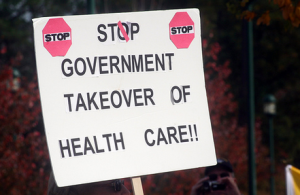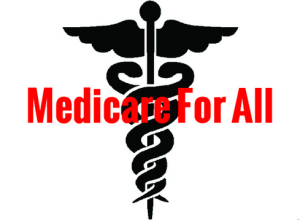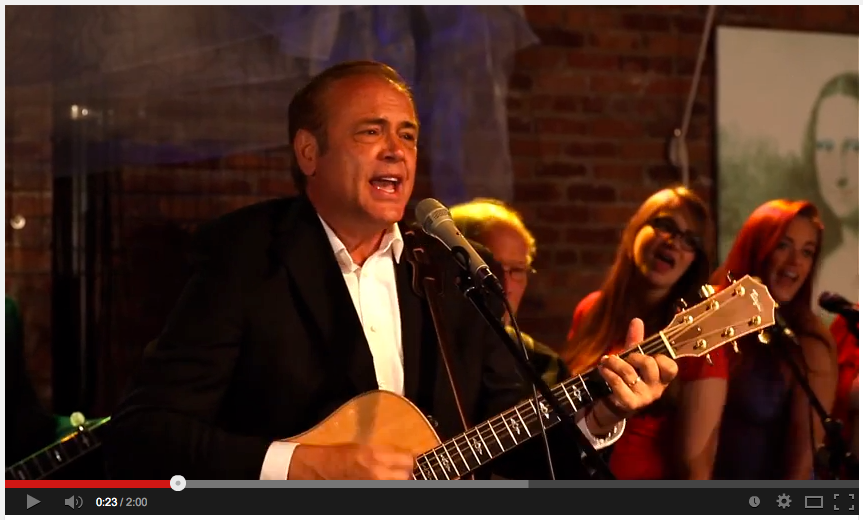For Minnesotans who can’t get health insurance from an employer, Minnesota Republican legislators have been demanding improvements.
 Out on the campaign stump, Republicans say they want more health plan options than are currently available. They want health insurance companies to feel more competitive pressure to keep a lid on premiums. They want consumers to have a broad network of health care providers available to them. They want assurances that there will always be at least one solid coverage option available to every Minnesotan, even when health insurance companies decide to pull out of the marketplace, as they have in recent years. Those are all good goals.
Out on the campaign stump, Republicans say they want more health plan options than are currently available. They want health insurance companies to feel more competitive pressure to keep a lid on premiums. They want consumers to have a broad network of health care providers available to them. They want assurances that there will always be at least one solid coverage option available to every Minnesotan, even when health insurance companies decide to pull out of the marketplace, as they have in recent years. Those are all good goals.
To achieve them, Republican state legislators should work with Governor Dayton to give Minnesotans a MinnesotaCare for All option.
Background
Currently in Minnesota, those who can’t get health insurance from an employer can get coverage from one of three sources:
- TOP TIER. For Minnesotans who can afford premium costs, they can purchase coverage from nonprofit health plans – UCare, HealthPartners, Medica, and Blue Cross. (As part of the federal Affordable Care Act, about 60% of those buying from these companies through the MNsure online shopping tool are offsetting premium costs with federal tax credits, which this year are averaging over $7600 per year.)
- MIDDLE TIER. For Minnesotans who can afford some, but not all, of the premium cost, they can purchase MinnesotaCare at a subsidized rate that varies depending on household income.
- LOWER TIER. For the poorest Minnesotans who can’t afford any of the premium cost, they can get Medical Assistance at no cost to them. Medical Assistance is Minnesota’s version of the federal Medicaid program.
MinnesotaCare for All Option
Governor Dayton proposes to give those in the top tier an additional option. He wants to give those consumers the option of buying into that middle tier — the public MinnesotaCare program.
Adding a MinnesotaCare for All option would achieve what Republicans say they want – more options for consumers, more marketplace competition to drive down prices, a guarantee that at least one plan option will always be available to Minnesotans, and consumer access to a broad network of Minnesota health care providers statewide.
A fact sheet from the Governor’s office elaborates on the consumer benefit:
Purchasing quality health coverage through MinnesotaCare is less expensive than buying coverage directly from a private insurer, because it leverages the buying power of more than 1 million Minnesotans enrolled in public plans.
Minnesotans who purchase MinnesotaCare would get high-quality health coverage for approximately $469 per month, on average. That is more than 12 percent ($69) less than the average statewide premium of $538 for private insurance in 2017.
Under the Governor’s proposal, families would spend on average $838 per person less in 2018 than in 2017 on their health insurance premiums.
After a one-time startup investment ($12 million), the cost of Governor Dayton’s plan would be funded entirely by the premiums of Minnesotans who choose to buy MinnesotaCare coverage. If the Legislature enacted this proposal by April 1, Minnesotans could purchase MinnesotaCare coverage as early as the 2018 open enrollment period.
Having this MinnesotaCare option would likely be very popular with Minnesotans. After all, a national poll found that an overwhelming 71 percent of Americans support a similar Medicare for All option, while only 13 percent oppose the idea.
Let Consumers Choose
Why would Republicans not want this for Minnesota consumers? If the Governor’s claims about the MinnesotaCare option turn out to be accurate, many of the Republicans’ stated goals for the individual market would be achieved.
At the same time, if the Governor’s MinnesotaCare-related claims about lower prices and better health care network turn out to be inaccurate or inflated, Minnesotans will surely reject the MinnesotaCare option. If it is to their advantage, consumers will choose a nonprofit health insurance company, or a for-profit health maintenance organization (HMO), which the Governor recently agreed to authorize as part of a compromise with Republican legislators.
With the addition of the MinnesotaCare option, private, nonprofit and public options all would be available to Minnesotans who are shopping and comparing via MNsure. Then the politicians could get out of the way, and let the consumers choose the option that works best for them.

 On the heels of the closing of the second year of open enrollment for Obamacare coverage, expect to hear a lot of “government takeover of health care” ranting from conservatives.
On the heels of the closing of the second year of open enrollment for Obamacare coverage, expect to hear a lot of “government takeover of health care” ranting from conservatives.

 Meanwhile, Rounds’ Democratic opponent Rick Weiland has been campaigning the old fashioned way. He is staying grounded, traveling the dusty byways in a minivan. Weiland is the first candidate in South Dakota history to campaign face-to-face in all of the state’s 311 towns. A couple of them are not metropolises.
Meanwhile, Rounds’ Democratic opponent Rick Weiland has been campaigning the old fashioned way. He is staying grounded, traveling the dusty byways in a minivan. Weiland is the first candidate in South Dakota history to campaign face-to-face in all of the state’s 311 towns. A couple of them are not metropolises.
